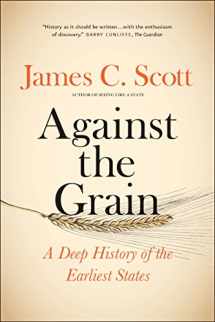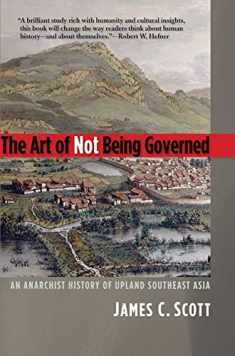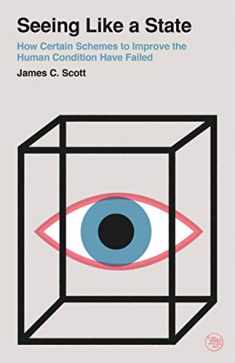
Against the Grain: A Deep History of the Earliest States
ISBN-13:
9780300240214
ISBN-10:
030024021X
Edition:
Reprint
Author:
James C. Scott
Publication date:
2018
Publisher:
Yale University Press
Format:
Paperback
336 pages
FREE US shipping
on ALL non-marketplace orders
Marketplace
from $9.95
USD
Marketplace offers
Seller
Condition
Note
Seller
Condition
Used - Acceptable
Used books may not include access codes or one time use codes. May have writing, underlining, highlighting, loose and/or ripped pages. Proven Seller with Excellent Customer Service. Choose expedited shipping and get it FAST.
Seller
Condition
New
Brand New! Not overstocks! Brand New direct from the publisher! Ships in sturdy cardboard packaging.
Book details
ISBN-13:
9780300240214
ISBN-10:
030024021X
Edition:
Reprint
Author:
James C. Scott
Publication date:
2018
Publisher:
Yale University Press
Format:
Paperback
336 pages
Summary
Against the Grain: A Deep History of the Earliest States (ISBN-13: 9780300240214 and ISBN-10: 030024021X), written by authors
James C. Scott, was published by Yale University Press in 2018.
With an overall rating of 3.8 stars, it's a notable title among other
Native American
(Americas History, Assyria, Babylonia & Sumer, Ancient Civilizations History, Mayan, Mesopotamia, Asian History, Civilization & Culture, World History, Slavery & Emancipation, Evolution) books. You can easily purchase or rent Against the Grain: A Deep History of the Earliest States (Paperback) from BooksRun,
along with many other new and used
Native American
books
and textbooks.
And, if you're looking to sell your copy, our current buyback offer is $2.71.
Description
An account of all the new and surprising evidence now available that contradicts the standard narrative for the beginnings of the earliest civilizations
Why did humans abandon hunting and gathering for sedentary communities dependent on livestock and cereal grains, and governed by precursors of today’s states? Most people believe that plant and animal domestication allowed humans, finally, to settle down and form agricultural villages, towns, and states, which made possible civilization, law, public order, and a presumably secure way of living. But archaeological and historical evidence challenges this narrative. The first agrarian states, says James C. Scott, were born of accumulations of domestications: first fire, then plants, livestock, subjects of the state, captives, and finally women in the patriarchal family—all of which can be viewed as a way of gaining control over reproduction.
Scott explores why we avoided sedentism and plow agriculture, the advantages of mobile subsistence, the unforeseeable disease epidemics arising from crowding plants, animals, and grain, and why all early states are based on millets and cereal grains and unfree labor. He also discusses the “barbarians” who long evaded state control, as a way of understanding continuing tension between states and nonsubject peoples.
Why did humans abandon hunting and gathering for sedentary communities dependent on livestock and cereal grains, and governed by precursors of today’s states? Most people believe that plant and animal domestication allowed humans, finally, to settle down and form agricultural villages, towns, and states, which made possible civilization, law, public order, and a presumably secure way of living. But archaeological and historical evidence challenges this narrative. The first agrarian states, says James C. Scott, were born of accumulations of domestications: first fire, then plants, livestock, subjects of the state, captives, and finally women in the patriarchal family—all of which can be viewed as a way of gaining control over reproduction.
Scott explores why we avoided sedentism and plow agriculture, the advantages of mobile subsistence, the unforeseeable disease epidemics arising from crowding plants, animals, and grain, and why all early states are based on millets and cereal grains and unfree labor. He also discusses the “barbarians” who long evaded state control, as a way of understanding continuing tension between states and nonsubject peoples.


We would LOVE it if you could help us and other readers by reviewing the book
Book review

Congratulations! We have received your book review.
{user}
{createdAt}
by {truncated_author}




